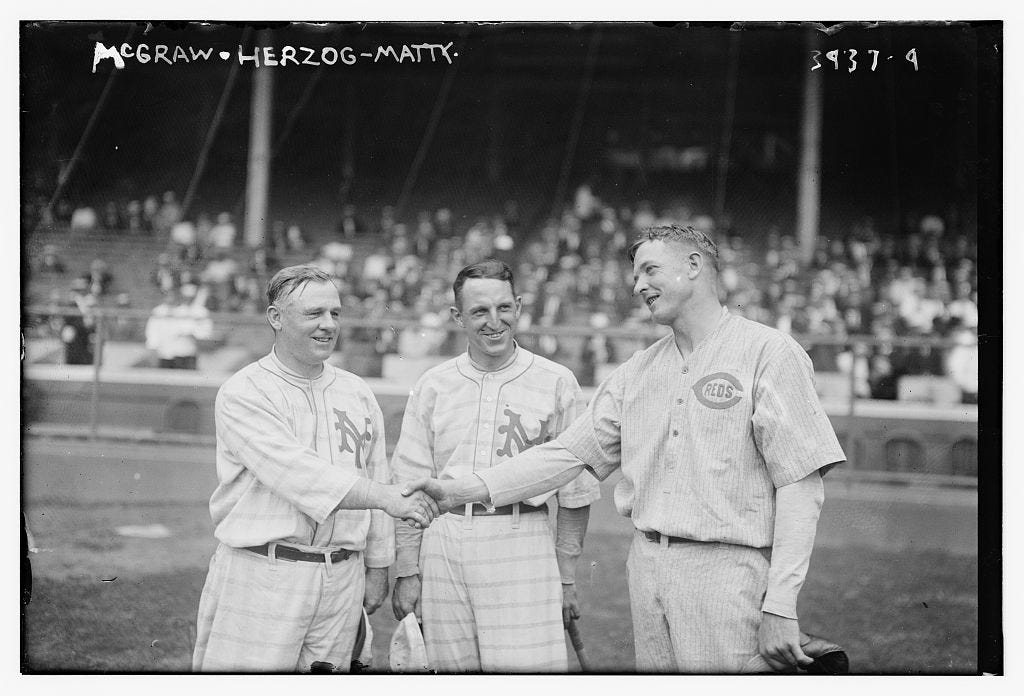Fourth Place!
How John McGraw earned a complete set of the works of Shakespeare.
Installment 1: The team with the longest winning streak in MLB history began it in fourth place, and after 26 consecutive wins, they were still there.
1. The scoreboard faded from view.
September 15, 1916 began with a gift.
New York Giants fans had raised $1,000 to buy a landscape painting for Christy Mathewson, who had been traded two months earlier to the Reds. Mathewson, winding down his legendary career, was back in town as the Reds’ player-manager, and before the final game of the series they gave him his present.
Then play began. The Reds scored early and were ahead 2-0 through four innings. “And then the unexpected happened,” W.J. MacBeth wrote, in his extraordinary game story for the New York Tribune. Out west, across the Hudson River, “sprang the most terrific thunderstorm of the year.” It wasn’t yet raining at the Polo Grounds, but as the teams switched sides for the start of the fifth inning “the entire aspect of the heavens changed. Great black clouds, riding on the gale, went scurrying past. Within a minute, the bright light faded to twilight, from twilight to semi-darkness.”
The Giants began to act with a fervor that had eluded them up to that point. Manager John McGraw abruptly announced he was replacing his catcher, Lew McCarthy. McCarthy sloooowly took his shinguards off, and Brad Kocher—the backup who hadn’t caught a pitch in a month—slooooowly put those shinguards on. McGraw was, MacBeth wrote, “playing for rain.” A game only counts if five innings are completed; otherwise, everything that happened gets washed away as if it hadn’t. So the Reds needed six more outs—three by their hitters, three by the Giants’—to make their lead count. A dampened crowd, tiny but agitated on the Giants’ behalf, was screaming at the umpire Cy Rigler to just cancel the rest of the game already. Mathewson was “bawling at McGraw and Rigler for speed.”
All the while it was growing darker and darker. “The scoreboard faded from view,” MacBeth wrote.
After the new catcher Kocher took his position behind the plate, the Giants’ infielders—one by one— “found their shoelacings loose at intervals.” Then Pol Perritt, the Giants’ pitcher, tried to keep the Reds’ hitters from making any outs: He “suddenly developed the most tantalizing streak of wildness. He couldn’t get the ball within ten feet of the plate.” But “those Red batsmen in the darkness had lost all sense of distance. They swung at everything that came up.” Perritt threw six tremendously wayward pitches, yet struck out the first two batters of the inning.
After each out, the Giants’ infielders threw the ball around the horn, wildly. They “pelted the ball all over the lot.” Then time was called as “the bat boy for New York went chasing all over the diamond for stray pieces of paper toyed in the wind.” The heaviest rains simply would not arrive to save the Giants.
Then Perritt hit on a brilliant idea: If he couldn’t pass the Reds, why surely he could hit them. He got [Edd] Roush after Eddie purposely missed two swings. Roush was so busy getting out of the way he didn’t have a chance to swing. Perritt tried the same game with [Hal] Chase. But Hal, a nimble fellow with a nimble brain, sidestepped and uppercut the pitch for the cutest little pop-up any fan ever saw. [Giants shortstop Art] Fletcher scanned the sky to see if the storm really meant to keep its date. It had just started down the Speedway entrance. So he decided to make the catch.
And, at that moment, the deluge began. The game was quickly paused for the rain and then called for darkness—had never happened. Of course, everybody there knew that a great miracle had happened, and they had all played a part in it, from the pitcher to the bat boy, from the infielders to the backup catcher, from the 462 fans to the great John McGraw.
The rain, MacBeth gleefully reported, “washed a lot of the verdure out of the landscape Mathewson has chosen.” The painting was ruined. The game was, in its way, saved.
A game between a fourth-place team and a last place team, playing out the string in the final weeks of the season, the only stakes being the Giants’ modest nine-game winning streak and the pride that comes of putting one foot in front of the other. But what effort—what drama—what fun! "There is no box score,” MacBeth concluded. “Hoho! Hoho!”
2. What May Be Thy Destination?
The Hero’s Journey conditions us to believe our journeys must be instigated by a call.




